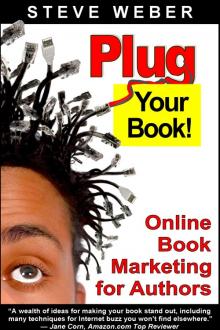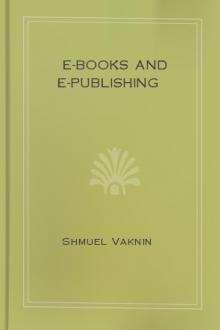Plug Your Book! by Steve Weber (books to read to be successful .txt) 📕

- Author: Steve Weber
- Performer: -
Book online «Plug Your Book! by Steve Weber (books to read to be successful .txt) 📕». Author Steve Weber
A short excerpt from the book.
Affiliate links to buy the book at online retailers.
Author photo.
Other bibliographic information such as ISBN, binding, page count and publisher.
Try to cap your excerpt at 2,000 to 3,000 words. Some readers won't persist in scrolling down two screens of continuous content. However, interested readers often print longer excerpts, so you should include a message encouraging printing at the top of long excerpts.
Excerpts that sell#Imagine you're riding in an elevator with a potential reader of your book. You have 20 seconds before the elevator door opens and your companion leaves. What can you say to compel him or her to walk to the nearest bookstore and buy your book as soon as the door opens? The answer is the heart of your excerpt.
When selecting sample passages, don't automatically take your excerpt from the front of the book. Material from a book's introduction can be dull for an unfamiliar audience.
More hints for a compelling excerpt:
Give chunks, not boulders. # For nonfiction, make your excerpt _the most essential, engaging _ nuggets in your book. Winning excerpts often contain lists, like "Top 10 ways to save money when buying a car" or "Three ways to ask someone on a date." Cliffhangers. # For fiction, try leaving readers in midair. Encourage interest in one or two characters. News angle. # For either fiction or nonfiction, try to find a news hook. Is there a current controversy or movie related to your book's topic? Topicality is blog oxygen. For fiction and nonfiction, a strong current-events hook can persuade A-list bloggers to host your tour.Don't send your excerpt as an e-mail attachment. Most people are apprehensive of receiving files from unfamiliar people. Instead, post the document on a dedicated page on your domain, and provide the link. Then your hosts can copy the document or link to it. After you've posted the file on your domain, don't delete it, because some blogs will link to your page instead of keeping the material on their site. The excerpt on your domain may get traffic for years to come.
To see an example of an excerpt, see:
#www.PatronSaintPr.com/ samples/mclaren/#
mclaren-obd.htmIn this excerpt, the title and author name is followed by an "Introduction" briefly establishing the author's credentials and describing the book. Next comes a passage from the text, more information about the book, bibliographic details, and a link to the publisher's Web site.
If you're working under contract with a publisher, ensure you're authorized to distribute excerpts. Many authors are surprised to learn they don't have online rights to their work. If necessary, get written permission in an e-mail from your publisher's marketing department. Often publishers will provide a PDF for your use as an online excerpt.
Your pitch to bloggers#Now your excerpt is ready and you've compiled a list of blogs for your tour. It's time to pitch your tour to the host bloggers. Contact each blogger individually by e-mail, explaining why your book is of interest. Provide two or three compelling reasons why your tour will be thought-provoking and entertaining for this blog's audience.
Start with your top prospects and work your way down as time permits. Contact bloggers directly; don't simply leave a comment on their blog and hope they notice it. Most blogs have a mechanism for contacting the blogger through an e-mail address or contact form.
Sometimes the more popular a blogger is, the harder it is to get their attention. If you can't find contact information, look at the bottom of the home page, where you may see instructions for contacting the "Webmaster." Sometimes an "advertise with us" link is the most reliable way of reaching a decision-maker.
Tailor your pitch for each blogger, addressing them by name, otherwise your message can be mistaken for spam. Offer a complimentary review copy of your book. Provide your complete contact information including phone number, which also differentiates your message from spam. The subject line of your e-mail must be specific; a generic "Please read this" often is deleted unread.
The excerpt includes everything the blogger needs to decide whether to approve your tour appearance. If approved, a copy of the excerpt can be posted at the host blog to promote your appearance in the days preceding the tour. Schedule no more than three to five blogs per week, which should keep you busy.
A sample pitch#Here's a sample script for pitching your blog tour:
SUBJECT: Author [NAME] as guest on [BLOG NAME]
Dear [BLOGGER NAME]
I'm a regular reader of your blog, and believe it's one of the best sites about [TOPIC]. I'm writing to see if you would consider having me as a guest on your blog on Monday, May 9, to discuss my book [TITLE].
I believe my book is of particular interest to your readership. [REASONS, BRIEFLY]
I'm hoping to have a dialog with your readers. If you approve, I'll take a day on your blog, make an opening statement, and respond to comments as long as they keep coming.
I hope you'll give this a try. I've prepared an HTML document with a short excerpt from the book and its cover art. You can view the document here at my site: http://www.example.com. You're free to reproduce this document on your site or provide links.
I'd also like to send a complimentary review copy of the book, just let me know where to mail it.
Thanks for your consideration,
[SIGNATURE]
[POSTAL ADDRESS]
[PHONE NUMBER]
Not every blogger will accept your pitch, and you shouldn't take the rejections personally--an acceptance rate of 25 percent is a good target. Some sites simply don't use book excerpts. Often blogs run by newspapers or magazines don't use third-party content except in sections labeled "opinion" or "to the editor."
As realistically as possible, pitch yourself as a potential long-term partner, not a drive-by opportunist. Successful blog tours will prompt return invitations and can launch a mutually beneficial relationship.
Your guest appearance#On the day of your blog tour appearance, open with a short statement, recapping the themes expressed in your book excerpt, and ask the blog audience for its reaction. Depending on how the blogger administers the site, you may be given a login and password for the site, or simply e-mail your material to the blogger.
Reaction from the blog audience can continue for several days, giving you the opportunity to reappear, replying to comments and answering questions.
Blog conversationWhen responding to a blog audience, be succinct and keep the conversation moving. Blog conversation is a two-way street, and exchanging ideas makes compelling content. At the end of each of your responses, conclude with a question, such as "What's your take on that?" or "How do you feel about this?"
Be prepared for the occasional rude or embarrassing question. For example, if your book is about barbecuing, be ready for questions from animal-rights activists. Feel free to ignore off-topic comments, and simply continue with your message. But don't shy away from substantive arguments--nothing sells a book better than controversy.
At each stop on your blog tour, mention your previous appearances on other blogs and provide the links. This will generate continued readership and cross-linking among blogs.
Archiving your results#Keeping screen shots of your blog appearances and a journal of your correspondence with bloggers can come in handy later. You can review the tour to see which sites and techniques were effective. Record the contact information for each blogger: their e-mail addresses, phone numbers, and mailing addresses. This way you'll have a running start if you decide to conduct another blog tour some months later.
To see archived screen shots of a blog tour, see:
www.PatronSaintPr.com/samples/ mclaren/ mclaren-blogreport.htm Encore appearances#Blog tours don't always cause a big spike in sales, but they do fuel word of mouth for your book and build name recognition. Each time you appear in front of your target audience, it's a plus. When a blog appearance goes particularly well, don't let it end there. Offer to write a monthly guest column for the blog in exchange for a link to your site and a permanent buy-the-book affiliate link.
Map out your blog tour strategy a few months before your publication date. But don't make the mistake of scheduling a blog tour or any other publicity before your book is available for sale. Blog tours spark impulse sales, so make sure anyone who wants the book is able to buy it.
More resourcesThe blog tour strategy outlined here is based on one developed by Patron Saint Productions, a literary consulting firm. For do-it-yourselfers, its Web site contains free sample materials you can adapt for your own tour:
www.PatronSaintPR.com/ samples.htmlAnother literary consultancy that specializes in blog tours is Author Marketing Experts Inc., headed by author Penny Sansevieri. Her site also features several free resources and a newsletter. See:
www.amarketingexpert.com/ free.html Social networkingWhen 24-year-old Steven Oliverez finished writing his debut fantasy novel, he faced the same predicament as most new authors. He wanted to sell the manuscript, but couldn't get a single publisher to read it, let alone buy it. He spent two years writing query letters, and all he got was a stack of form-letter rejections.
So Oliverez decided to self-publish and promote the book himself. Fortunately, he wasn't starting from scratch. He'd been active on the wildly popular social site MySpace, networking with other fantasy readers and authors. On his MySpace blog, he'd given away seven of his short stories to anyone willing to read them. His stories prompted hundreds of enthusiastic comments and attracted thousands of MySpace "friends."
So when Oliverez published Elder Staves in 2005, he asked for a little help from his MySpace friends. He asked them to buy the book on Amazon, and they did--pushing it to No. 25 on the fantasy bestseller list. Then Oliverez started getting messages from book clubs around the country, asking if he'd make phone-in appearances. After that came some write-ups in publishing trade magazines. Few tools can attract and bind an audience than a network like MySpace, Oliverez says:
Buzz creates more buzz. Since there's no marketing or publishing company behind the book, it really helps to be online, able to connect with readers directly. Being on MySpace makes you seem more approachable, and that makes it a great tool for authors.
Next Oliverez printed 30,000 personalized bookmarks, and asked his MySpace friends to pass them out at bookstores and coffee shops. Immediately he got a few dozen volunteers. Then Oliverez found more MySpace friends by joining several of its "groups" for authors and fiction-writing.
You can visit Oliverez on MySpace and read the first two chapters of his book at:
#www.MySpace.com/Oliverez#
MySpace: Not just for kidsWhat Oliverez did wasn't new. He took a page from the thousands of unsigned rock bands that have tapped MySpace to build their audiences. It's a simple yet wonderfully effective strategy: The bands put samples of their music on their MySpace profile, and friends forward the songs to an ever-enlarging circle of friends. Bands that "go viral" on MySpace





Comments (0)